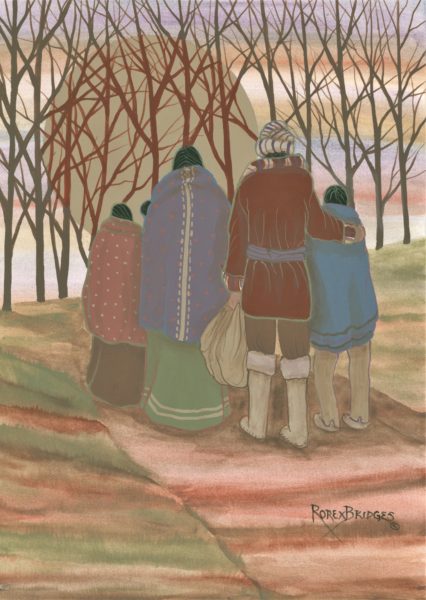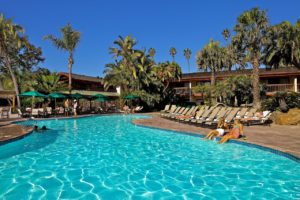
- Details
- By Rich Tupica
The American Indian Institute, University of Oklahoma Outreach, presents: The Red Road: Journey to Health and Wellness for Future Generations @ Catamaran Resort Hotel and Spa, San Diego, California Important: Hotel conference room rate ends March 12
Main Conference: April 14-16, 2020 Native Fitness Workshop: April 16-18, 2020 StressCare Mastery and Mentor Workshop: April 16-18, 2020
Note: The University of Oklahoma will provide 1.5 continuing education credits (CEUs) or 15 contact hours.
SAN DIEGO — While the American Indian Institute (Aii) celebrates 65 years of collaboration with American Indian, Alaska Native and First Nations communities, the Institute is also preparing for its important conference. For the annual event, this year’s theme is The Red Road: Journey to Health and Wellness for Future Generations, happens April 14-16, and focuses on providing vital information about Native women’s and men’s health and wellness. Beyond that, additional post-conference trainings run April 16-18.
The mission is for attendees to recharge their spirits through shared experiences, knowledge, wisdom and inspired-research. Best practices are explored with the help of numerous experts. Of course, it will approach Native health and wellness from a holistic perspective of strength, resilience and balance. The roster of 10 keynote speakers all specialize in dealings with Native people and include: Chef, Native food historian, professor, and author of the first Native American book to win the James Beard Award, Lois Ellen Frank, PhD (Kiowa), Chef Walter Whitewater (Diné/Navajo), Culinary Advisor for Frank’s award-winning book, and actively engaged Native chef and instructor, Belinda Biscoe, PhD, Interim Senior Associate Vice President for University of Oklahoma Outreach and Director of the Southwest Prevention Center, and Captain Kari Hearod (Choctaw) LCSW, SAMHSA Region 6 Regional Administrator.
 This year’s conference will be held here, at the Catamaran Resort Hotel and Spa in San Diego, California.
This year’s conference will be held here, at the Catamaran Resort Hotel and Spa in San Diego, California.
The location is held beachfront at the Catamaran Resort Hotel and Spa in San Diego’s Pacific Beach community. The sunny resort offers up casual elegance with palm trees, lush vegetation, tiki torches, koi ponds, waterfalls and exotic birds. When the conference winds down, it’s the perfect site for sunbathing at the beach, relaxing by the pool or rejuvenating in a hot tub that overlooks the bay. Guests can also paddle board and then cruise the boardwalk on a bike or Segway. As for the conference itself, the staff at Aii is thrilled to once again bring folks together for a good cause.
“There will be more than 18 exhibitors and vendors this year,” said organizer Nina R. Barbee, PhD, a proud member of the Choctaw Nation and Interim Director for Aii. “They’ll be providing educational resources, and important health information. There will also be plenty of handmade Native baskets, jewelry, pottery and drums. There will be so much to see and appreciate.” The event is ideal for anyone working with American Indian, Alaska Native and Canadian First Nations Communities—but also representatives from various health, wellness and medical fields. Each year, the diverse group of attendees span from Tribal Leaders to social workers, and everything in between. “It’s about helping Indigenous Nations of North America strengthen their existing capacity to ensure sustainable, healthy and culturally vibrant communities for the generations to come,” Barbee said.
In short, the Aii, at University of Oklahoma Outreach, hosts this annual conference for the overall betterment of Indigenous peoples’ wellbeing. It calls together the best thinking in Native American health and wellness, presents expert speakers, and encourages everyone to network and learn from each other.
This conference covers an array of vital areas that focus on creating healthier futures, including: Information on mental health emergencies (suicide prevention), tools to prevent substance misuse, the Navajo Wellness Model, cooking healthy ancestral Native foods, exercise as medicine, the mind body connection, healing historical trauma, diabetes prevention, rekindling your spirit with humor, viewing health and wellness through the lens of resilience, nourishing our Indigenous languages, herbal aromatherapy, understanding gaming, decoding the fountain of youth, and other important topics. 2020 Topics: Five Tracks (20 concurrent sessions)
- Physical Health: Health Promotion and Disease Prevention
- Social and Emotional Health
- Substance Misuse Treatment and Prevention
- Spiritual Well-Being
- Art, Culture, and Language Preservation: Strengthening Healthy Tribal Cultures
The common thread at The Red Road conference, is that both historically and contemporarily, health and wellness are viewed by Native people from a holistic perspective encompassing all aspects of individuals and communities. At the resort, attendees will enjoy morning walks on the beach, water exercises, healing circles, morning blessings, prayers, and engagement with local culture keepers, i.e. Bird Songs with representatives of the Kumeyaay Nation, the first people of this region.
Natural elements always play an important role in the physical, mental, emotional and spiritual health and well-being of Native people. Balance among these different dimensions promotes both prevention and healing. The path to wellness is often referred to as “the Red Road” — a journey and way to well-being that Native people must travel in order to be truly well and healthy. For those looking to explore this further, this year’s conference is a must.
For more information, visit: aii.ou.edu
More Stories Like This
“We Are Still Here” | Kelly Church Is Weaving Tradition, Advocacy, and Hope into Black Ash BasketryHere Come the Aunties!
California Indian Nations College Achieves Full 8-Year Accreditation
New Ojibwe Children’s Book Shares the Seven Grandfather Teachings Through ‘Aaniin: I See Your Light'
"Stronger Than" by Nikki Grimes and Stacy Wells (Choctaw)
Help us defend tribal sovereignty.
At Native News Online, our mission is rooted in telling the stories that strengthen sovereignty and uplift Indigenous voices — not just at year’s end, but every single day.
Because of your generosity last year, we were able to keep our reporters on the ground in tribal communities, at national gatherings and in the halls of Congress — covering the issues that matter most to Indian Country: sovereignty, culture, education, health and economic opportunity.
That support sustained us through a tough year in 2025. Now, as we look to the year ahead, we need your help right now to ensure warrior journalism remains strong — reporting that defends tribal sovereignty, amplifies Native truth, and holds power accountable.
 The stakes couldn't be higher. Your support keeps Native voices heard, Native stories told and Native sovereignty defended.
The stakes couldn't be higher. Your support keeps Native voices heard, Native stories told and Native sovereignty defended.
Stand with Warrior Journalism today.
Levi Rickert (Potawatomi), Editor & Publisher
